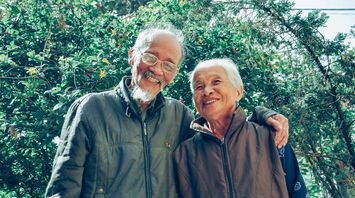Six healthy habits of long-livers from the world's blue zones

At a time when life expectancy is declining in many countries and nutrition-related diseases are becoming one of the leading causes of early death, it's no wonder that Dan Buettner's research on people who have lived to be a hundred years old is attracting a lot of attention. His new documentary on Netflix, "Living to 100: Secrets of the Blue Zones," is now among the most popular on the streaming service.
According to the GPB website, according to Buttner's research, the probability that residents of any of the blue zones will live to their 100th birthday is 3 times higher than that of people living outside them. And not to be unfounded, the director introduces us to long-livers who garden, cook, sing, laugh and play.
Of course, for most of us, it is impossible to trade places with these islanders who eat organic food grown with their own hands. However, we can borrow their simple habits and customs.
Swap your comfortable chair for a mat and a garden.
Include movement in your day. Those who don't like going to the gym can be inspired by the way people in the "blue zones" do it every day.
"Plant a garden in your backyard," says Buettner. "It will encourage you to do something useful every day - weeding, watering, or harvesting - and it will get you moving."
In addition, instead of lying on the couch, emulate the people of Okinawa, who spend more time on the floor, sitting on their haunches.
Switch to "peasant" food
"People in the blue zones eat the cheapest peasant food," says Buettner.
Although the blue zones he visits are geographically different, their diets are similar. The five main components of their diets are whole grains, vegetables, herbs, beans, and sweet potatoes.
"In addition," said Buettner, "people there live at a slow pace and use a lot of herbs in their cuisine."
"The Sardinians love rosemary. In Costa Rica, in the Nicoya region, they love cilantro, and in Icaria, fennel, oregano, and sage are popular."
"They know how to make their peasant food tasty, and that's the secret," he concludes.
Reduce the amount of meat
Buettner analyzed about 150 dietary studies conducted in the Blue Zones over the past 80 years. "If you average their results, more than 90% of the diet is composed of complex carbohydrates - whole plant foods," he says. For example, Okinawans eat a lot of sweet potatoes, which are rich in vitamin A. And on the Nicoya Peninsula in Costa Rica, the main food is squash, which is rich in carotenoids.
The typical American diet includes about 220 pounds of meat per person per year. In the blue zones, this figure is 10 times less.
In Okinawa, tofu is the staple, eaten twice a day, mixed with vegetables and herbs. In addition, the key principle of eating there is to stop when you are 80% full.
Tip: one of the most effective ways to realize how much you eat is to turn off the TV, put your phone away, and make the dining room table a place where you can enjoy your food without rushing. Mindful eating has been proven to help people significantly reduce the number of calories they consume.
Get rid of loneliness
The island of Nicoya in Costa Rica is a "blue zone," a 30-mile strip of grassland and rainforest. The climate here is warm and sunny. People don't make a lot of money, but the country's healthcare system is of high quality, and the likelihood that a person in this region will live to be 90 is three times higher than in the United States. According to Buettner, the isolation from the rest of the world has helped people to come together. "They rely on each other," he says.
"For Costa Ricans, not only does family come first, but their customs and rituals bring them together. They are usually Catholics, so they go to church. Holidays are a priority," he explains.
Tip: If organized religion isn't your thing, there are plenty of ways to find a community of interest, whether it's playing pickleball, joining a gardening (hiking) club, or participating in community service projects in your neighborhood.
Rebuild social networks to make friends and gain a sense of purpose
"The best way to extend your life is to control your immediate environment," Buttner explained.
"That doesn't mean you have to ditch an old friend who has bad habits, but he's likely to have the wrong influence on you," the filmmaker says.
Tip: Adopt the Okinawan rules of behavior, where people organize themselves into small groups, called moai, to support and encourage each other.
This can be done on your social media as well. One strategy is to edit your feed so that it includes posts from people who share your interests and values. If someone makes you feel uncomfortable, say goodbye to them. Instead, find people who inspire you and make your life more meaningful.
Take a nap instead of an afternoon espresso
To get through a stressful day, we usually drink coffee rather than decompress. But this is the opposite of the "blue zone" mindset.
Alternatively, take a nap for 20 minutes after lunch. According to Buettner, he picked up this habit on Ikaria, where it is very hot and people go to bed at midnight. Accordingly, they wake up late, so everyone here has a siesta in the afternoon.
The latest scientific data shows that a 20-minute nap in the afternoon can compensate for an hour of sleep deprivation and helps keep you alert throughout the day.



















